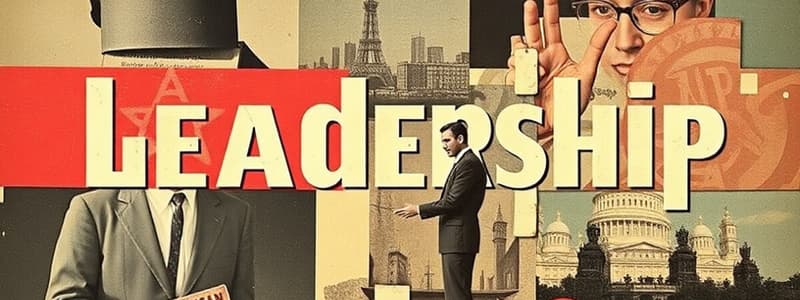Podcast
Questions and Answers
An effective customer service culture can only exist if leaders show fear and act out of control.
An effective customer service culture can only exist if leaders show fear and act out of control.
False (B)
Leaders are solely responsible for the success of an organization in a customer service environment.
Leaders are solely responsible for the success of an organization in a customer service environment.
False (B)
A customer service-oriented culture can thrive even in difficult situations with the right leadership approach.
A customer service-oriented culture can thrive even in difficult situations with the right leadership approach.
True (A)
Interdependency in an organization means individual employees should not share the workload equally.
Interdependency in an organization means individual employees should not share the workload equally.
Empowerment in leadership allows employees to make decisions that positively impact both the customers and the company.
Empowerment in leadership allows employees to make decisions that positively impact both the customers and the company.
Leadership in customer service is defined solely as the control of extraordinary analytical skill.
Leadership in customer service is defined solely as the control of extraordinary analytical skill.
Successful leaders in customer service need to understand both individual motivations and group purposes to be effective.
Successful leaders in customer service need to understand both individual motivations and group purposes to be effective.
Without strong leadership, customer service teams are likely to excel in maintaining high levels of customer satisfaction.
Without strong leadership, customer service teams are likely to excel in maintaining high levels of customer satisfaction.
Effective leadership in customer service is important for implementing innovative solutions and fostering continuous improvement.
Effective leadership in customer service is important for implementing innovative solutions and fostering continuous improvement.
Excellent leaders in customer service do not need to share their vision with others in the organization.
Excellent leaders in customer service do not need to share their vision with others in the organization.
Flashcards
Interdependent Environment
Interdependent Environment
All team members share responsibility for success ensuring no one individual is overburdened, and everyone contributes to the common goal.
Leadership Empowerment
Leadership Empowerment
Leaders empower employees to make decisions that benefit both customers and the company. This instills confidence, fosters initiative, and encourages knowledge-sharing.
Customer Service Culture
Customer Service Culture
A company culture where customer service is at the heart of every action. Leaders instill this by demonstrating positive attitudes, encouraging risk-taking, and promoting respect for all.
Role of Leaders in Customer Service Culture
Role of Leaders in Customer Service Culture
Signup and view all the flashcards
Respectful and Supportive Work Environment
Respectful and Supportive Work Environment
Signup and view all the flashcards
What is leadership?
What is leadership?
Signup and view all the flashcards
What is a key role of a leader?
What is a key role of a leader?
Signup and view all the flashcards
How do leaders motivate their teams?
How do leaders motivate their teams?
Signup and view all the flashcards
What is the impact of leadership in customer service?
What is the impact of leadership in customer service?
Signup and view all the flashcards
How do leaders empower their teams?
How do leaders empower their teams?
Signup and view all the flashcards
Study Notes
Leadership in Customer Service
- Leadership is defined as the accomplishment of a goal through the direction of human assistants
- Leadership research since 1961 rejected the idea of leadership being about power and force
- Effective leaders understand employee motivations and integrate individual needs into the group's purpose
- The customer service industry requires strong leadership
- Strong leaders set the tone for a customer-centric culture, drive performance, and inspire exceptional service
- Leaders motivate staff, handle challenges (e.g., customer dissatisfaction, high turnover), and maintain quality standards
- Effective leadership fosters innovation and continuous improvement adapting companies to customer needs
- Demonstrating interdependency, vision, and empowerment create a culture of excellence in customer service
Defining Leadership Roles
- Leaders can be formal or informal
- Formal leaders hold official positions and have the authority and power of their position
- Formal leaders may have been given special training to better prepare them for their roles
- Formal leaders have accountability to their superiors
- Informal leaders have no official authority but influence others
- Informal leaders are not chosen by management
- Informal leaders can help or hurt formal leadership depending on their goals
Defining Coach or Counselor Roles
- Leaders serve as both coaches and counselors to employees
- Effective leaders need to be available to train, correct, and encourage employees
- They need to help employees overcome challenges, and shape their future leadership expectations
- Employees need leaders who encourage and support their success
- Leaders have high expectations and motivate employees to perform well
- Leaders value delegation, responsibility, authority, and accountability, supporting good performance.
- Confrontation, offering opportunities for growth, is part of leadership
- Leaders need to recognize and reward employee efforts, notice both successes and struggles in employee performance
Developing a Customer Service Culture
- Culture is defined as the values, beliefs, and norms of a group
- A customer service environment should have a customer service-oriented culture
- Leadership can inspire positive attitudes even when situations are difficult
- Leaders should demonstrate confidence, and be aware if they are acting out of control, which influences employee's attitude
- Customer service requires a positive attitude, not just a positive employee attitude.
- Leaders who treat everyone with respect foster a strong cultural environment
- A positive culture supports efficiency and encourages taking risks.
- Leaders should show concern and respect for employees, support the problems-solving process, and provide recognition
Effective Goal Setting
-
Leadership requires finding the balance between what needs to be done and who needs to do it
-
This balance is aided by the establishment of well-defined goals
-
A goal is a clearly-defined result that someone wants to achieve.
-
Goals that are written down are more likely to be achieved
-
Goal setting is the process of establishing and evaluating goals, which also involves identifying what needs to be accomplished.
-
Effective goal setting includes specific goals; details of how the goal will be accomplished; including a deadline
Job Aids
- Job aids are leadership tools that reinforce training
- Job aids create an easily accessible knowledge resource for employees and customers
- Job aids can be used to address knowledge gaps
- Job aids are useful for remembering procedures and for ensuring successful task completion
-
- Examples include operating machines or filing claim procedures
Leadership without a Position
- Sometimes informal leaders emerge in customer service environments, even when formal managers are not doing their job
- Informal leaders can help to create a better customer service environment
- Informal leadership can require a degree of assertiveness
- People can take leadership initiatives through positive interactions with co-workers
- The individual's actions can impact and encourage others
- These individual actions can improve the workplace environment and customer satisfaction
Demonstrating Leadership
- Congratulating someone for handling a situation well
- Making suggestions to improve work efficiency for management.
- Greeting coworkers with a smile.
- Treating others as you would like to be treated.
- Using positive methods to inspire and encourage others.
Boss Expectations
- Your boss is also a customer, their expectations should be met
- Actively attempt to meet boss/customer needs.
- Be a team player allowing your boss to act as a leader.
- Understand your boss’ priorities and what's important to them.
- Work as a collaborative member of the team. Avoid complaining or negative attitudes.
- Have realistic expectations for your abilities and what you can do to support the team
Self-Appraisal
- Leadership starts by knowing oneself
- Leaders should identify their strengths and weaknesses
- An effective leader is aware of their own strengths, and weaknesses
- A leader must learn to recognize these aspects of themselves.
- A self-appraisal can involve answering questions about individual strengths and weaknesses
Quick Quiz Answers
- True
- True
- True
- False
- False
- True
- False
- True
- True
- True
Studying That Suits You
Use AI to generate personalized quizzes and flashcards to suit your learning preferences.





